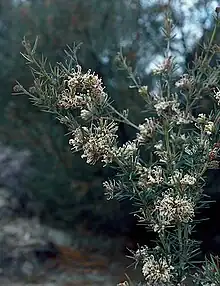Grevillea parviflora
Grevillea parviflora, commonly known as small-flower grevillea,[2] is a species of flowering plant in the family Proteaceae and is endemic to the Sydney region of eastern New South Wales. It is a low, dense, spreading to erect shrub with more or less linear leaves and white flowers with a red style that sometimes turns red as it ages.
| Grevillea parviflora | |
|---|---|
 | |
| In Budawang National Park | |
| Scientific classification | |
| Kingdom: | Plantae |
| Clade: | Tracheophytes |
| Clade: | Angiosperms |
| Clade: | Eudicots |
| Order: | Proteales |
| Family: | Proteaceae |
| Genus: | Grevillea |
| Species: | G. parviflora |
| Binomial name | |
| Grevillea parviflora | |
Description
Grevillea parviflora is a dense, spreading to erect shrub that typically grows to a height of 1 m (3 ft 3 in) or less and sometimes forms a rhizome. Its leaves are more or less linear, mostly 15–35 mm (0.59–1.38 in) long and 0.8–1 mm (0.031–0.039 in) wide with the edges turned down or rolled, the lower surface silky hairy when visible. The flowers are arranged in groups of 4 to 14 on the ends of branches, the groups usually shorter than the nearby leaves. The flowers are white with rust-coloured hairs, the style sometimes turning red with age, the pistil usually 4.5–6.5 mm (0.18–0.26 in) long. Flowering occurs from July to December and the fruit is a glabrous, warty follicle 8–10 mm (0.31–0.39 in) long.[3][4]
Taxonomy
Grevillea parviflora was first formally described in 1810 by Robert Brown in Transactions of the Linnean Society of London.[5][6] The specific epithet (parviflora) means "small-flowered".[7]
In 2000, Robert Owen Makinson described two subspecies of G. parviflora in the Flora of Australia, and the names are accepted by the Australian Plant Census:
- Grevillea parviflora subsp. parviflora Makinson[8] has more or less erect main branches, leaves mostly 0.8–1.3 mm (0.031–0.051 in) wide and the "stalk" of the ovary 1.0–1.2 mm (0.039–0.047 in) long.[9][10]
- Grevillea parviflora R.Br. subsp. supplicans[11] has more or less spreading main branches, leaves mostly 0.6–2 mm (0.024–0.079 in) wide and the "stalk" of the ovary 0.5–0.6 mm (0.020–0.024 in) long.[12][13]
Distribution and habitat
This grevillea grows heath or shrubby or heathy woodland in the Sydney region. Subspecies parviflora is mostly found west and south of Sydney between Camden, Appin and Cordeaux Dam with disjunct populations near Putty, Cessnock and Cooranbong. Subspecies supplicans occurs north-west of Sydney near Arcadia, Maroota and Marramarra National Park.[9][10][12][13]
Conservation status
Subspecies parviflora is listed as "vulnerable" under the Australian Government Environment Protection and Biodiversity Conservation Act 1999 and the New South Wales Government Biodiversity Conservation Act 2016 and subsp. supplicans as "endangered" under the Biodiversity Conservation Act 2016.[2][3][9][12]
References
- "Grevillea parviflora". Australian Plant Census. Retrieved 8 August 2022.
- "Approved Conservation Advice for Grevillea parviflora subsp. parviflora (Small-flower Grevillea)" (PDF). Australian Government Department of Agriculture, Water and the Environment. Retrieved 9 August 2022.
- Makinson, Robert O. "Grevillea parviflora". Royal Botanic Garden Sydney. Retrieved 30 July 2022.
- "Grevillea parviflora". Australian Biological Resources Study, Department of Agriculture, Water and the Environment: Canberra. Retrieved 8 August 2022.
- "Grevillea parviflora". APNI. Retrieved 8 August 2022.
- Brown, Robert (1810). "On the Proteaceae of Jussieu". Transactions of the Linnean Society of London. 10 (1): 171. Retrieved 8 August 2022.
- Sharr, Francis Aubi; George, Alex (2019). Western Australian Plant Names and Their Meanings (3rd ed.). Kardinya, WA: Four Gables Press. p. 271. ISBN 9780958034180.
- "Grevillea parviflora subsp. parviflora". Australian Plant Census. Retrieved 9 August 2022.
- Makinson, Robert O. "Grevillea parviflora subsp. parviflora". Royal Botanic Garden Sydney. Retrieved 9 August 2022.
- "Grevillea parviflora subsp. parviflora". Australian Biological Resources Study, Department of Agriculture, Water and the Environment: Canberra. Retrieved 9 August 2022.
- "Grevillea parviflora subsp. supplicans". Australian Plant Census. Retrieved 9 August 2022.
- Makinson, Robert O. "Grevillea parviflora subsp. supplicans". Royal Botanic Garden Sydney. Retrieved 9 August 2022.
- "Grevillea parviflora subsp. supplicans". Australian Biological Resources Study, Department of Agriculture, Water and the Environment: Canberra. Retrieved 9 August 2022.